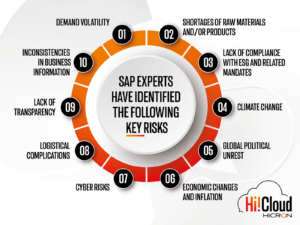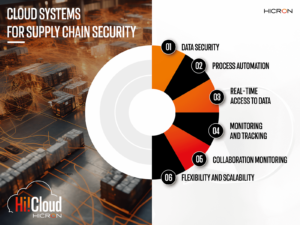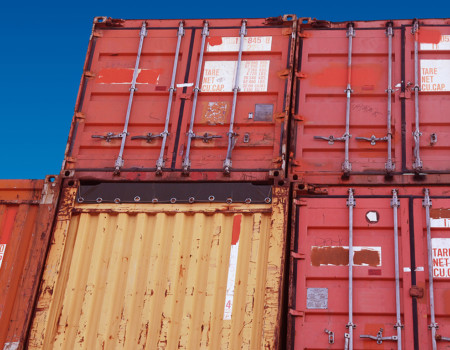Despite the current lack of an epidemic threat, supply chain risk is still a current concern for many business owners. Some of them are looking for ways to ensure their company’s security in this regard. Many areas of potential risk have been identified, as well as proven methods to address them. Cloud technology has a unique role to play here.
What is supply chain risk?
Supply chain risk refers to all possible threats that may occur during the process of delivering products/services. They can affect all the logistics operations carried out in a company, their effectiveness, success, efficiency, and even the company’s image and Customer trust. Sometimes delivery complications result in significant delays, reduced Customer bases, and even lost revenue.
The aforementioned pandemic is not the only threat that organizations face in the delivery process. When running a business, you need to consider each of these threats and secure your company in a way that meets current market standards, the needs of a growing business, and the needs of your Customers.

What is the primary source of risk in a supply chain?
Given the complexity of the problem, it is impossible to point to a single reason for the failures that companies encounter at various stages of delivering orders to Customers. Such complications are unique to each case.
However, there is one factor that can help diagnose the problems that a given organization is facing. This refers to the diversity and complexity of the factors that influence the course of a supply chain and its effectiveness. They can come from a variety of sources – suppliers, geopolitical issues, product specifics, transportation, or market variables in specific locations. Some of them may be specific to one industry, others to another.
Supply chain issues can affect all companies, regardless of their country of origin. In 2022, research conducted in the United States showed that the risk with the greatest impact on supply chains was global political unrest. This problem shows no signs of abating. The war in Ukraine, rising energy prices, persistent inflation, data scattered across multiple locations, incomplete documentation, bottlenecks at various stages of delivery, or inadequately secured systems are just a few examples of factors that make it difficult for companies to maintain supply chain stability.
It is important to remember that supply chain risks do not occur in isolation, but often combine to create a single, complex environment in which one problem causes another, or they occur simultaneously, side by side. To overcome them, it is necessary not only to diagnose them correctly, but also to find their source.
What risks can occur in a supply chain?
The supply chain risks that organizations face along the way are diverse and come from a variety of sources. What can disrupt a supply chain?
SAP experts have identified the following key risks:
- demand volatility – products and services are becoming obsolete faster than ever; consumers want to buy new items as soon as they are launched; to remain attractive on the market, companies need to be agile and flexible, and – above all – perfectly adapt to the rapidly changing needs of buyers; preventing the negative impact of this risk requires, among other things, maximum coordination of the work of teams involved in product launches, but also the integration of modern project work environments and enterprise departments;
- shortages of raw materials and/or products – as a result of complications related to the insufficient number of available articles, semi-finished products, and other components needed for production, companies often adopt a strategy of pre-stocking warehouses; such practices mean that the spaces needed for the storage of finished products or simply for the activities of other company departments are sometimes occupied by excess parts needed for production; unfortunately, this is not a solution to the shortage problem; in a dynamically changing production and market environment, it is important to ensure the continuity of a supply chain in a way that is consistent with technological innovation and the sustainable development policy of companies;
- lack of compliance with ESG and related mandates – production companies have many obligations related to compliance with regulations and restrictions regarding the management of production as well as its environmental and social impact; any failure to comply with such obligations results in serious consequences such as fines, sanctions, operational complications, and sometimes even product recalls; to run a company that complies with ESG standards and meets the requirements of the institutions that oversee these areas, it is necessary to provide the company with safeguards in the form of procedures and processes that organize the areas of the business that can be a source of such risks;
- climate change – this is a global issue that affects business in general; the effects of the climate crisis, which have been progressing for years, have caused many complications, and phenomena such as fires, floods, hurricanes, prolonged droughts, and many other effects of environmental degradation significantly affect the safety and well-being of ecosystems, society, and – therefore – business; in the face of these complications, companies need the support of systems that allow them to quickly develop alternative logistics plans, locate suppliers, and monitor the state of the company’s resources; solutions are also needed to help organizations comply with changing climate regulations or use green energy;
- global political unrest – this risk was identified as one of the greatest threats to business in 2022; armed conflicts, new dimensions of warfare, also in the online space, political tensions, exclusion of certain areas from business activity, or blockades of ports, which are often unannounced and come as a surprise also to entrepreneurs; problems blocking supply chains in such cases can be prevented or minimized; support of modern cloud systems can help the company develop alternatives for areas blocked by the tense geopolitical situation;
- economic changes and inflation – the threat of recession or skyrocketing inflation is a problem that most countries are currently facing; these complications increase the cost of maintaining a company, employees, fuel, and energy; they are also related to the issue of availability of products, semi-finished products, and elements needed for production; price increases force many entrepreneurs to stop producing expensive components; however, as research shows – an efficient, advanced cloud system helps avoid obstructions and maintain continuity of a supply chain thanks to the numerous functions of forecasting and constructing alternative production scenarios;
- cyber risks – storing data in the cloud offers companies enormous opportunities and helps them achieve their intended business goals, provided they use secure systems; cyber attacks are now common and many companies face complications at some supply chain stages due to the activities of cyber criminals; therefore, choosing the cloud alone does not guarantee security for the organization; only by choosing proven systems that meet modern security standards can you use them comfortably without fear of attacks and data theft;
- logistical complications – this risk is largely related to the above-mentioned geopolitical situation, as well as to competition on the supplier market; sea and air attacks, road blockades, and reduced port capacity are factors that effectively make it difficult to maintain continuity of supplies; modern cloud-based technological solutions allow you to view the routes of orders in real time, as well as to select alternative ways of delivering items in the event of sudden failures or accidents; in addition, they help monitor inventory levels and inform about possible overflows in transshipment centers, even suggesting alternatives;
- lack of transparency – transparency in this context refers to the visibility of delivery stages outside a company’s structures; this affects not only the company’s image (transparency of practices, compliance with laws and top-down directives), but also the ability to track the stages of supply chain execution by business partners and suppliers, which improves communication and implementation of subsequent activities; in organizations whose operations are supported by cloud systems, such information can be continuously updated and communicated to authorized users in real time; this also enables efficient localization of shipments and ensures even greater security of delivery, using, for example, cloud-connected geolocation;
- inconsistencies in business information – the proper functioning of a supply chain also depends on the devices used by the company, customers, developers, business partners, and even sellers; data can come from all these sources and must be consistent to minimize the risk of discrepancies; in this case, cloud systems protect companies by providing a common database that provides its users with consistent, unified, and reliable information.

Cloud systems for supply chain security
Just as there are many sources of complications that arise during the journey of a product/service from a company to its Customer, there are many ways to deal with them and overcome the challenges. Using various tools to prevent and solve specific problems can be a way out of many difficult situations. But doesn’t such a variety of environments, workflows, and contract models add more chaos to an already complex process?
For better organization, maximum security, technological adaptation, and ease of use, it pays to use cloud solutions. The systems offer extremely extensive capabilities. In addition to a vast data repository, they enable an entire organization and its employees to work using a single tool.
In the context of supply chain security, cloud systems offer the following functions:
- data security – this includes solutions such as data encryption, user rights management, and access control; the state-of-the-art technologies used to develop cloud systems also guarantee their compliance with applicable legal standards and required security measures; all of this helps companies to minimize the threats to which their data is exposed;
- process automation – enables changes in subsequent stages of a supply chain by standardizing and automating them in a way that eliminates human error and improves the effectiveness of an organization’s activities;
- real-time access to data – storing information in the cloud allows you to keep it up-to-date and constantly monitor any changes introduced; this allows all authorized users to access all changes, delivery status, availability of company resources, and all relevant parameters in real time; all this helps you to respond to any unforeseen situations, changes, and maintain the effectiveness of your business strategy;
- monitoring and tracking – enables continuous control of delivery stages, tracking of shipments, and execution of the entire supply chain, allowing delays and complications to be anticipated or detected more quickly and effective action to be taken to prevent or minimize them so that they do not disrupt the supply chain;
- collaboration monitoring – enables more efficient and faster exchange of information between users and collaborative work of logistics partners, suppliers, company employees, and their Customers, which improves the transparency of activities and streamlines the implementation of subsequent stages of delivery;
- flexibility and scalability – allows organizations to adjust the amount of resources and company infrastructure to meet ever-changing needs; gives companies the agility to respond to changing Customer needs, demand, and supply changes.

SAP S/4HANA – a cloud of possibilities for your business
The cloud system that provides all of these capabilities is SAP S/4HANA. Its advanced, cutting-edge technology is designed to fully support businesses at every level of their operations.
This software prioritizes security, efficiency, innovation, and flexibility. With security systems and compliance with applicable regulations, SAP S/4HANA ensures maximum protection of data stored in the cloud and protection against cyber attacks. Dedicated teams of specialists keep security up to date and complex. As a leading ERP vendor, SAP has the financial resources to provide Clients with a secure place to store their enterprise data. This is backed by numerous prestigious certifications and the trust of thousands of partners and users.
The innovation of S/4HANA consists in making the system as up to date as possible. This is not only for the convenience of the Client, but also to ensure the excellent quality of the software and the continued sustainable development of the companies that benefit from its support. Updates are made automatically within each module and function, making the tool adaptable to the needs of any industry, different departments within an organization, and the most demanding users.
The SAP system is flexible not only because of the versatility of its functionalities. This technology adapts to the user’s needs in a way that does not require any effort. Like a fingerprint, SAP S/4HANA has a unique character in every organization. In addition, the subscription price already includes the cost of software maintenance, so any changes you make will not result in an additional amount on the invoice. No additional hardware support is required.
For complete supply chain security, S/4HANA is also equipped with real-time analytics and continuous reporting. This allows you to track orders and shipments, respond to obstacles, take appropriate action before a problem occurs, and monitor every stage of operations in real time. As a result, situations such as a port blockade will not ruin your company’s finances and will allow you to maintain the trust of your Customers by delivering on time.
If you want to ensure a safe and successful implementation of the SAP S/4HANA system for your business, you need to choose a suitable, experienced partner to carry out the project. It pays to choose specialists who will continue to support the software after the implementation is complete, providing service, development support, and even business consulting.







